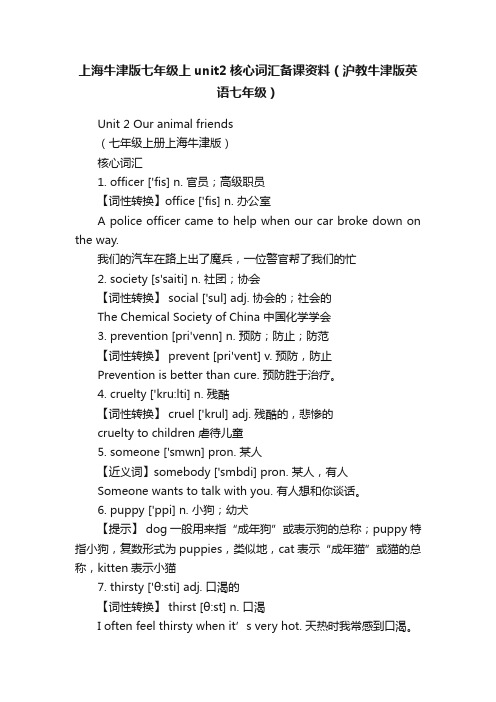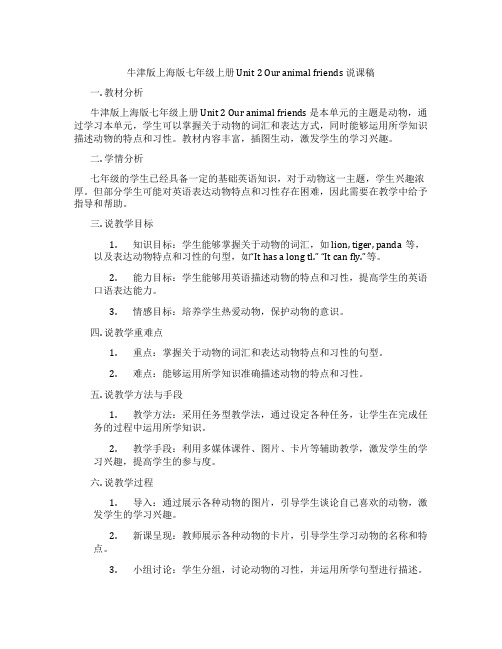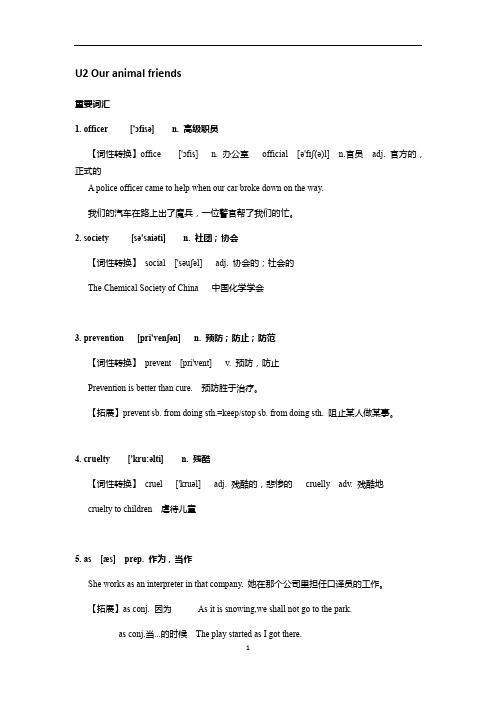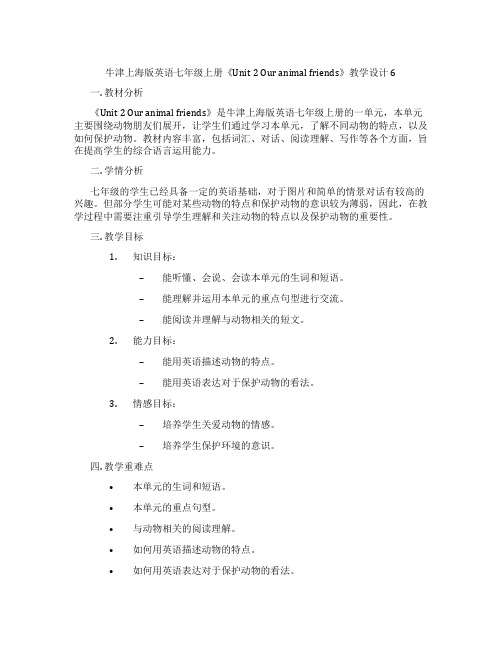牛津上海英语七上《Unit 2 Our animal friends》[李老师]【市一等奖】优质课2
上海牛津版七年级上unit2核心词汇备课资料(沪教牛津版英语七年级)

上海牛津版七年级上unit2核心词汇备课资料(沪教牛津版英语七年级)Unit 2 Our animal friends(七年级上册上海牛津版)核心词汇1. officer ['fis] n. 官员;高级职员【词性转换】office ['fis] n. 办公室A police officer came to help when our car broke down on the way.我们的汽车在路上出了魔兵,一位警官帮了我们的忙2. society [s'saiti] n. 社团;协会【词性转换】 social ['sul] adj. 协会的;社会的The Chemical Society of China 中国化学学会3. prevention [pri'venn] n. 预防;防止;防范【词性转换】 prevent [pri'vent] v. 预防,防止Prevention is better than cure. 预防胜于治疗。
4. cruelty ['kru:lti] n. 残酷【词性转换】 cruel ['krul] adj. 残酷的,悲惨的cruelty to children 虐待儿童5. someone ['smwn] pron. 某人【近义词】somebody ['smbdi] pron. 某人,有人Someone wants to talk with you. 有人想和你谈话。
6. puppy ['ppi] n. 小狗;幼犬【提示】 dog一般用来指“成年狗”或表示狗的总称;puppy特指小狗,复数形式为puppies,类似地,cat表示“成年猫”或猫的总称,kitten表示小猫7. thirsty ['θ:sti] adj. 口渴的【词性转换】thirst [θ:st] n. 口渴I often feel thirsty when it’s very hot. 天热时我常感到口渴。
牛津上海版七年级第一学期Unit2Ouranimalfriends基础知识点及语法点(无答案)

牛津上海版七年级第一学期Unit2Ouranimalfriends基础知识点及语法点(无答案)Unit 2 Our animal friendsRead the text and answer the questions above the text.Q1. What do unkind people do to their pets?___________________________________________________________ Q2. What do SPCA officiers do to save animals?___________________________________________________________ Q3. What must people promise to do when they get a pet from SPCA?___________________________________________________________ Q4. How does the SPCA take care of sick animals?___________________________________________________________一、单词二、句型1.I prefer the black one.①prefer+n _____________.—Which one do you like better? Chicken or fish?—I ________meat.②prefer A to B ____________eg. _______________________________________.在狗与猫之间我更喜欢狗。
_______________________________________.大多数人愿意坐火车而不愿坐汽车。
牛津上海版七年级英语上册教学设计:Unit2Ouranimalfriends

4.布置课后作业,如让学生写一篇关于自己最喜欢的动物的小短文,巩固课堂所学知识,培养学生的写作能力。
五、作业布置
为了巩固本章节所学知识,培养学生的语言实际运用能力,特布置以下作业:
1.请学生根据自己的喜好,选择一种动物,运用本节课所学的词汇和句型,写一篇关于该动物的小短文。要求描述动物的外貌、特点、习性和技能,不少于80词。
d.鼓励学生课后参加与动物相关的实践活动,如参观动物园、做动物保护志愿者等,将所学知识与社会实践相结合。
四、教学内容与过程
(一)导入新课(500字)
1.教师以生动有趣的故事引入新课,例如:“Once upon a time, there was a clever dog named Biscuit. He could do many interesting things, such as fetching a ball, shaking hands, and even dancing. Today, we are going to learn about our animal friends and their amazing skills.”(从前,有一只聪明的狗叫饼干。它会做很多有趣的事情,比如捡球、握手,甚至跳舞。今天,我们将要学习关于我们的动物朋友和它们的神奇技能。)
4.鼓励学生在日常生活中用英语与他人交流,增强学生的跨文化意识,提高学生的国际视野。
二、学情分析
针对牛津上海版七年级英语上册Unit2 Our animal friends这一章节,学情分析如下:七年级学生正处于青春期,他们对新鲜事物充满好奇,尤其对动物有着浓厚的兴趣。在此基础上,学生对本章节的学习将表现出较高的积极性和参与度。然而,学生在英语语言基础、学习方法和情感态度方面仍存在一定差异。
初中英语 牛津上海七年级上册Unit2 Our animal friends课后练习(有答案)

Ⅰ. Read and choose the best answer.1. It’s kind ________ you to give us so much help.A. onB. toC. ofD. about2. _______ does it take you to walk to your school?A. How farB. How soonC. How longD. How many times3. She was tired, so she went to ________ soon.A. sleepingB. asleepC. sleepyD. sleep4. You don't have to keep him________at the gate.A. WaitB. waitedC. waitingD. to wait5. He_________ the key everywhere, but he couldn't__________it.A. looked for; find outB. found; look forC. looked for; findD. found; find out6. I'm sorry. I_________my homework at home this morning.A.forgetB. forgotC. leaveD. left7. Billy, _________e at chocolates before you go to bed.A. doesn'tB. not toC. NotD. don't8. Hurry up,__________you'll be late.A. andB. orC. soD. /9. Dogs can help people_________.A. in the wayB. in this wayC. on the wayD. in many ways10.There are many modern buildings on_________side of the road.A. bothB. everyC. eitherD. neither11.Mr. Li promised___________ in the room.A. no smokingB. not smokeC. not to smokeD. not smoking12.What did he_________ at the meeting just now?A. talkB. sayC. speakD. tell13.Most of us don't know__________ about how life is formed.A. manyB. littleC. fewD. much14.—Have you got any books on music? I want to borrow________.—Yes. You can find them on the top shelf of the second bookcase.A. itB. anyC. oneD. them15.—Would you like some more?—___________.I'm full.A.Yes, pleaseB. I'd love toC. No, I wouldn'tD. No, thanks1 6.Dad was worried all the week. His dog was ___________A. losingB. missingC. missedD. losted1 7.It is strange that the goose can ___________ our farm.A. guideB. guardC. huntD. chew1 8.I had no time to feed my rabbit yesterday evening. I ___________ my homework.A. was doingB. have doneC. doD. will do19. Bears often sleep in winter in ___________.A. garagesB. cavesC. waterD. jugs20. They stopped the elephant _________ running across the busy street.A.inB. offC. fromD. withoutII. Complete the sentences with the given words in their proper forms(用括号中所给单词的适当形式完成下列句子):(共10分)1. Nothing can ______ us from carrying out the plan. ( prevention )2. Many________ services are still provided by volunteers(志愿者)in our city. ( society )3. It is ________ to see so much open country. ( love )4. How can you be so _______ and still call yourself my friend?( kind )5. The _______ of the ship is the captain's responsibility. ( safe )6. The pilot landed the plane _______. ( safe )7. Three _______ planned to break into a bank. ( thief )8. Five people died in war (战争)and more than one thousand were injured. One person is still_______. ( miss )III. Rewrite the following sentences as required (根据所给要求,改写下列句子,每空格限填一词):(共10分)1. It is ten minutes’ walk from his new flat to the park. (对划线部分提问)________ ________ is it from his new flat to the park?2. It’s a great pity that you missed the lecture again.(改为感叹句)_________ ___________ ___________ pity you missed the lecture again!3. His mother told him not to waste time on fishing. (改为被动语态)He _______ ________ _______to waste time on fishing by his mother.4. The ice on the river is too thin for us to skate on. (保持句意基本不变)The ice on the river is not ________ ________ for us to skate on.5. Lily had a good time during her stay in Beijing. (改为否定句)Lily ________ ________ a good time during her stay in Beijing.6. "Can you help me carry these boxes upstairs?" Mary asked Tom. (合并为一句)Mary asked Tom ______ he _______ help her carry these boxes upstairs.7. If you don’t know “ Stay hungry, stay foolish”, surf the internet. (保持句意基本不变)You _____ _____ surf the internet if you don’t know “ Stay hungry, stay foolish”.Ⅰ. Choose the words or expressions and complete the passage.A. Choose the best answer.(根据短文内容,选择最恰当的答案)Most people have dogs as pets. But do you know that dogs can also do different jobs?On September 11, 2001, terrorists attacked the US and nearly 3,000 people died. At that time over 300 dogs were there to help to find and save people. They are working dogs.The US army began to use dogs during World War I. Now, about 2,700 dogs are working in Afghanistan and Iraq, according to Discovery News. These four-legged soldiers use their powerful sense of smell to find bombs (炸弹), drugs (毒品) and enemies.Dogs are “man’s best friend”. They can help us work better.The most common jobs for working dogs are in search and rescue. They can find lost people or bodies after a big disaster or in the wild. Guide dogs can help blind people walk safely. These dogs can understand some words. Guide dogs are popular in the US and Japan. Many guide dogs visited China during the 2008 Olympic Games.There are also dogs working with doctors. They can help autistic (自闭症的) children. These children sometimes don’t talk and like to do the same things again and again. A study from Canada in 2010 showed that dogs could make autistic children feel relaxed and safe.Herding dogs are important to sheep owners. They keep the sheep safe. They are common in Australia, New Zealand and some parts of China. Nowadays, many people have them as pets.So dogs are not only our pets but also our workmates now.() 1.Working dogs in Afghanistan and Iraq help to _______.A) keep people safe B) find and save peopleC) find bombs, drugs and enemies D) keep the environment clean() 2.The most common jobs for working dogs are in _______.A) helping blind people walk safely B) search and rescueC) helping autistic children D) keeping sheep safe() 3.Guide dogs are popular in _______.A) China and Japan B) Canada and the USAC) Australia and the USA D) the USA and Japan() 4. A lot of guide dogs came to China in _______.A) 2001B) 2700C) 2008D) 2010() 5.The underlined word “herding dogs ” means .A) 狩猎犬B) 牧羊犬C) 警犬D) 玩具犬() 6.The best title for this passage is _______.A) Four-legged soldiers B) Guide dogs are popularC) Dogs are our pets D) People and dogs make a great teamB. Choose the words and expressions and complete the passage.(选择最恰当的单词或词语完成短文)A thirsty bee went to a river to drink. As it was drinking, the bee was carried away by the running water.A kind bird saw that the bee was in danger. It picked a leaf off a tree and threw it into the water in front of the bee. The bee climbed onto the leaf, and it was brought ____1___ to the land. The bee thanked the bird a lot and then flew away. Not ____2___ that, the bird was sitting ____3___ the branch of a tree. It did not know that a man was shooting at it. But the bee saw ____4___ the man was doing. So it flew into the man's ____5___ and stung(刺蜇) him. The pain in the man's eye was so great that he was not able to ____6___ the bird, and the bird flew away. ____7___, the bee, whose life had been saved by the bird, was able to save the life of thebird.( ) 1. A. safety B. safe C. saved D. safely( ) 2. A. long before B. before long C. after long D. long after( )3. A. in B. on C. at D. by( )4. A. that B. what C. which D. when( )5. A. eye B. nose C. mouth D. ear( )6. A. shoot B. shoot at C. shoot to D. shoot on( )7. A. In the way B. On the way C. In a way D. In this wayC. Read the passage and fill in the blanks with proper words.(在短文的空格内填入适当的单词,使其内容通顺,每空格限填一词,首字母已给)Can animals be made to work for us? Some scientists think that one day animals may be t_____1_____ to do a number of simple jobs .They s_____2_____ that in a film or on TV we may see elephants, monkeys, dogs, bears, or other animals doing a lot of things .If you w_____3_____ carefully , you may find that those animals are given something to eat in return for doing jobs for man . The scientists say that many d_____4_____ animals may be taught to do a number of simple jobs if they will get something to eat.Of course, as we know, dogs can be used to guard a house, and elephants can be used to do some heavy j_____5_____ . And we can also teach animals to work in f_____6_____ .Apes, for example, have been w_____7____ used in America to help make cars and scientists say that these monkeys may one day get in crops and e_____8_____ drive trains.1. ________2. ________3. ________4. ________5. ________6. ________7. ________8. ________D. Answer the questions. (根据短文内容回答下列问题)The kiwi lives only in New Zealand. It is a very strange bird because it cannot fly. The kiwi is the same size as a chicken. It has no wings or tail. It does not have feathers like other birds. Its feathers look like hair. Each foot has four toes. Its beak is very long.A kiwi likes to have a lot of trees around it. It sleeps during the day because the sunlight hurts its eyes. It can smell things very well. It smells things better than most birds do. The kiwi’s eggs are very big.There are only a few kiwis in the New Zealand now. People do not often see them. The government says that people cannot kill kiwis. New Zealanders want their kiwis to live.There is a picture of kiwi on New Zealand money. People from New Zealand are sometimes called ‘kiwis’.1. Does kiwi only live in New Zealand?_____________________________________________________________________________2. What is strange for a kiwi?_____________________________________________________________________________3. How big is a kiwi?_____________________________________________________________________________4. What’s the reason for which the kiwi sleeps during the night?_____________________________________________________________________________ 5. Why can’t people kill kiwis?_____________________________________________________________________________6. What’s the other meaning of ‘kiwi’?_____________________________________________________________________________Ⅰ. Writing.(写作)Write a short passage of at least 60 words about the topic “My favorite animal”. (请以“我最喜欢的动物”为题写一篇不少于60词的短文,标点符号不占格。
上海牛津版本七年级上册Module1Unit2课堂笔记(WORD版)

上海牛津版本七年级上册Module1Unit2课堂笔记(WORD版)Unit 2 Our animal friendsP101.an SPCA officer 一位爱护动物协会的官员an officer 官员/ an office 办公室/ official adj. 官方的2.the SPCA = the Society for the Prevention of Cruelty to Animals 爱护动物协会prevent v. / prevention n.prevent ... from / stop ...from/ keep...from 阻止...3.be cruel to 是残忍的对... / n. cruelty / be unkind to4.Thank you very much. ---You’re welcome./ It’s a pleasure 荣幸/ My pleasure./With pleasure. / Not at all.一点也不用谢/ That' s all right. 没关系I'm sorry.---Never mind.(在意)/ It doesn' t matter. (有关系)/ That' s all right. 没关系Right. / It' s right. / This is right. / That' s right. / … is right. 对的All right. = OK. 好的Thank you./ I’m sorry. ---That’s all right. 没关系5.不定代词someone/ somebody/ something / somewhereanyone/ anybody/ anything / anywhereno one/ none/ nobody/ nothing / nowhereeveryone/ everybody/ everything/ everywheresomeone else 其他某人/something interesting 重要的某事(不定代词加形容词)6.puppy- puppies/country-countries/family-families/factory-factories/ secretary-secretaries/ hobby- hobbiesholiday- holidays / trolley- trolleys7.leave – left - left / find- found- found/ have, has- had- had8.have no food or water 没有食物和水9.be hungry and thirsty 是又饿又渴10.be lovely adj. 是可爱的11.take them the SPCA 带它们去爱护动物协会take –took - takentake sb to sp 带某人去某地12.keep one as your pet 养一个作为你的宠物/ keep – kept - keptkeep/ raise / have / feed 养13.the black one 黑色的这个14.prefer sth = like sth better 更喜欢某物/ prefer to do sth 更喜欢去做某事prefer A to B = like A better than B 更喜欢A 比起B上海牛津版本七年级上册Module1Unit2课堂笔记(WORD版)like sth best 最喜欢某物/My favourite is...prefer – preferred - preferred / prefers15.our animal friends 我们的动物朋友们16.What is the SPCA? / Do you know what the SPCA is17.a puppy 小狗/ a kitten 小猫18.which one 哪一个/ the brown one 棕色的这一个19.is, am/are- was/were-beenP111.look after/ care for/ take care of 照顾look after...well / care for...well/ take care of ...well/ take good care of 好好照顾with care 带着小心/be careful 是小心的/a careful girl 一个细心的女孩/careless 粗心的hold it carefully adv. 小心地抱着它2.feed-fed-fed 喂养/give – gave - given3. a basket to sleep in 一个篮子去睡在里面harddog biscuits to chew 硬的狗饼干去咀嚼abowl of water to drink 一碗水去喝a blanket to keep him warm 一个毯子去保持他温暖4.five minutes’walk/ 1 kilometre / How far 五分钟的步行路程/1 公里/多远for two days/ take / How long 两天/多久once/ twice/ three times/ four times/… 一次/两次/三次/四次/ How many timesalways, usually, often, sometimes, seldom(极少), never(从不), every day, once a day ---频率/ How oftenin two days / soon/ How soon 两天以后/ 多久以后5. special dog food for puppies 特殊狗粮给小狗的dog food for bigger dogs 狗食给大一点的狗的6. with both hands 用双手/ by hand 手工地(How)7. have exercise = do exercise = exercise 做运动don’t have exercise/don’t do exercise/ have no exercise = do no exercise 不做运动do many English exercises 做许多英语练习do morning exercises 做早操/ do eye exercises 做眼保健操8.take him to the countryside 带它到乡村9.play with him/ play with a ball 玩一个球10.buy a lot of things for our puppies= buy our puppies a lot of things11.for a walk 为了一次散步/ take a walk / have a walk12.take notes 记笔记/ make a booklet 做一个小册子make- made- made13.need 行为v. 否定句要加助v. ( do/ does/ did )need sth/ don’t need sth 需要某物need to do sth/ don’t need to do sth 需要去做某事情态v. needn’t do sth 不必做某事= don’t need to do sth= don’t have to do sthadj. necessary 有必要的P121.save many animals 拯救很多动物save / rescue v.safe adj. / safely adv. / safety n. / unsafe/ unsafely2.be unkind to 对...不友好的/ be kind/friendly to 对...友好的/ be cruel to 对...残忍的3.save animals from danger 救动物们从危险中/ keep ...from.../ protect... from...4.也:also 句中/ too 肯定句句末/ either 否定句句末5.help sb(to)do sth 帮助某人去做某事help sb with sth 帮助某人某事6.promise sb (not) to do sth 承诺某人去(不)做某事7.sick animals 生病的动物们be sick/ be ill 是病的8.a quiz about... 一个测试关于...9.leave them in the street 把它们抛弃在街上10.however, = but11.clinics for sick animals 为生病动物们的诊所12.in the SPCA / get a pet from the SPCA13.the vets in the clinics 在诊所里的兽医们14.ask / tell/ want / promise 承诺/ would like sb (not) to do sthmake / let/ have/ would rather 宁愿/ had better 最好sb (not) do sth要某人做(不做)某事15.联系动词感官动词look, seem 看上去/smell 闻上去/ taste 吃上去/ sound 听上去/ feel 感觉taste nice 吃上去美味的/ feel happy 感觉快乐的变得长得be / go / get / grow/ turn / becomeget angry 变得生气的/go bad 变得变质的/ go wrong 变得错误的/ grow healthy 长得健康的/ grow strong 长得强壮的/ grow bigger 长得更大/ turn red 变得红的/ turn yellow 变得黄的使,保持make / keep / staymake safe/ keep safe 保持安全keep warm 保持温暖make me happy 使我快乐/make sick people better 使病人好点make our city a safe place 使我们的城市成为一个安全的地方keep the class rules 保持(遵守)这些班级规则keep healthy, stay healthy 保持健康的keep strong, stay strong 保持强壮的keep them clean 保持它们是干净的P131.be/ go/ come back= return 回来go- went- gone / come -came- come2.ask sb. (not ) to do sth 叫某人(不)做某事3.make a display about 做一个展板关于...4.guard the cave guard- guarded- guarded 守卫这ft洞/ a guard 一个保安5.keep people safe from danger 从危险中保持人们安全的6.cross the road safely 安全地过马路cross v. / across prep. 介词go/come/walk/ run across= cross walkacross the road = cross the road7.hunt animals for good 猎取动物为食/go hunting 去打猎/ a hunter 猎人8.eat-ate-eaten9.in many different ways 在许多不同的方面10.the police 警方11.catch thieves 抓小偷a thief catch – caught - caught12.find missing people 找到失踪的人find -found - found13. a sheep/ two sheep14.on their farms 在农场上/ a farmer 农民15.bring other animals to the farmer 把其他动物带到农民那里去bring – brought – brought/ buy- bought- bought16.with love 带着爱/ 划线提问用how17.go shopping 购物/ swimming 游泳/ cycling 汽车/ boating 划船/ fishing 钓鱼/ skating 溜冰/ climbing 爬ft/ hiking/ travelling 旅行/diving 潜水/ running 跑步/ jogging (jog v.)慢跑/ windsurfing 帆板/ sightseeing 观光Writing1.Dogs are our best friendsDogs are our best friends. Many , many years ago, people lived with dogs in caves. Dogs guarded the caves and kept people safe from danger. Today, dogs help people in many different ways. They help the police catch thieves and find missing people. Dogs help blind people. They help blind people cross the road safely. They help farmer on their farms. They can guard our homes and play with people. How useful dogs are! We should take care of them with love.2. A plan for a trip to BeijingThe winter holidays are coming soon. I am going to Beijing with my family because it’s an ancient city. We are going there by plane. We are going to stay there for a week. We will visit museums, palaces and parks there. We can see a lot of old buildings and temples at the Summer Palace. We can see beautiful mountains f rom the Great Wall. I’m sure We will have a wonderful time.3.My plan for the winter holidaysThe winter holidays are coming soon. I must do my homework carefully every day. I will do some reading and watch TV at night. It will be fun to play football with my friends. What's more, I am going to Beijing with my family because it’s an ancient city. We will visit museums, palaces and parks there. We can see a lot of old buildings and temples at the Summer Palace. We can see beautiful mountains from the Great Wa ll. I’m sure we will have a wonderful time.。
牛津版上海版七年级上册Unit2Ouranimalfriends说课稿

牛津版上海版七年级上册 Unit 2 Our animal friends 说课稿一. 教材分析牛津版上海版七年级上册Unit 2 Our animal friends 是本单元的主题是动物,通过学习本单元,学生可以掌握关于动物的词汇和表达方式,同时能够运用所学知识描述动物的特点和习性。
教材内容丰富,插图生动,激发学生的学习兴趣。
二. 学情分析七年级的学生已经具备一定的基础英语知识,对于动物这一主题,学生兴趣浓厚。
但部分学生可能对英语表达动物特点和习性存在困难,因此需要在教学中给予指导和帮助。
三. 说教学目标1.知识目标:学生能够掌握关于动物的词汇,如lion, tiger, panda等,以及表达动物特点和习性的句型,如“It has a long tl.” “It can fly.”等。
2.能力目标:学生能够用英语描述动物的特点和习性,提高学生的英语口语表达能力。
3.情感目标:培养学生热爱动物,保护动物的意识。
四. 说教学重难点1.重点:掌握关于动物的词汇和表达动物特点和习性的句型。
2.难点:能够运用所学知识准确描述动物的特点和习性。
五. 说教学方法与手段1.教学方法:采用任务型教学法,通过设定各种任务,让学生在完成任务的过程中运用所学知识。
2.教学手段:利用多媒体课件、图片、卡片等辅助教学,激发学生的学习兴趣,提高学生的参与度。
六. 说教学过程1.导入:通过展示各种动物的图片,引导学生谈论自己喜欢的动物,激发学生的学习兴趣。
2.新课呈现:教师展示各种动物的卡片,引导学生学习动物的名称和特点。
3.小组讨论:学生分组,讨论动物的习性,并运用所学句型进行描述。
4.实践环节:学生分角色扮演,模拟描述动物的特点和习性。
5.总结提升:教师引导学生总结本节课所学内容,强调保护动物的重要性。
七. 说板书设计板书设计如下:Our animal friends•Lion: It has a long tl.•Tiger: It has four legs.•Panda: It is black and white.八. 说教学评价教学评价采用形成性评价和终结性评价相结合的方式。
初中英语 牛津上海七年级上册Unit2 Our animal friends知识点及语法点讲解

U2 Our animal friends重要词汇1. officer ['ɔfisə] n. 高级职员【词性转换】office ['ɔfis] n. 办公室official [ə'fɪʃ(ə)l] n.官员adj. 官方的,正式的A police officer came to help when our car broke down on the way.我们的汽车在路上出了魔兵,一位警官帮了我们的忙。
2. society [sə'saiəti] n. 社团;协会【词性转换】social ['səuʃəl] adj. 协会的;社会的The Chemical Society of China 中国化学学会3. prevention [pri'venʃən] n. 预防;防止;防范【词性转换】prevent [pri'vent] v. 预防,防止Prevention is better than cure. 预防胜于治疗。
【拓展】prevent sb. from doing sth.=keep/stop sb. from doing sth. 阻止某人做某事。
4. cruelty ['kru:əlti] n. 残酷【词性转换】cruel ['kruəl] adj. 残酷的,悲惨的cruelly adv. 残酷地cruelty to children 虐待儿童5. as [æs] prep. 作为,当作She works as an interpreter in that company. 她在那个公司里担任口译员的工作。
【拓展】as conj. 因为As it is snowing,we shall not go to the park.as conj.当...的时候The play started as I got there.6. prefer [pri'fə:] v. 更喜欢【用法】prefer A rather than B 宁愿A而不要Bprefer A to B 喜欢A而不喜欢B;喜欢A胜过B (sth./doing sth.)=would rather do than do.=like A better than B=prefer to do rather than doprefer to do sth. 更喜欢做某事prefer doing sth. 宁愿做某事— Do you prefer coffee or tea? 你喜欢咖啡还是茶?— I prefer coffee to tea. 我喜欢咖啡胜过茶。
牛津上海版英语七年级上册《Unit 2 Our animal friends》教学设计6

牛津上海版英语七年级上册《Unit 2 Our animal friends》教学设计6一. 教材分析《Unit 2 Our animal friends》是牛津上海版英语七年级上册的一单元,本单元主要围绕动物朋友们展开,让学生们通过学习本单元,了解不同动物的特点,以及如何保护动物。
教材内容丰富,包括词汇、对话、阅读理解、写作等各个方面,旨在提高学生的综合语言运用能力。
二. 学情分析七年级的学生已经具备一定的英语基础,对于图片和简单的情景对话有较高的兴趣。
但部分学生可能对某些动物的特点和保护动物的意识较为薄弱,因此,在教学过程中需要注重引导学生理解和关注动物的特点以及保护动物的重要性。
三. 教学目标1.知识目标:–能听懂、会说、会读本单元的生词和短语。
–能理解并运用本单元的重点句型进行交流。
–能阅读并理解与动物相关的短文。
2.能力目标:–能用英语描述动物的特点。
–能用英语表达对于保护动物的看法。
3.情感目标:–培养学生关爱动物的情感。
–培养学生保护环境的意识。
四. 教学重难点•本单元的生词和短语。
•本单元的重点句型。
•与动物相关的阅读理解。
•如何用英语描述动物的特点。
•如何用英语表达对于保护动物的看法。
五. 教学方法1.情境教学法:通过图片、实物、情景对话等方式,创设情境,让学生在实际情境中学习和使用英语。
2.任务型教学法:通过小组讨论、角色扮演等任务型活动,引导学生主动参与学习,提高学生的语言运用能力。
3.情感教学法:引导学生关注动物的特点和保护动物的重要性,培养学生的关爱动物情感和保护环境的意识。
六. 教学准备1.教学课件:制作与动物相关的课件,包括图片、视频等。
2.教学材料:准备与动物相关的阅读材料。
3.教学用具:录音机、磁带、单词卡片等。
七. 教学过程1.导入(5分钟)–利用图片或视频展示本节课的主要动物,引导学生谈论动物的特点,激发学生的学习兴趣。
2.呈现(10分钟)–呈现本节课的生词和短语,让学生听音认词,并用单词卡片进行操练。
- 1、下载文档前请自行甄别文档内容的完整性,平台不提供额外的编辑、内容补充、找答案等附加服务。
- 2、"仅部分预览"的文档,不可在线预览部分如存在完整性等问题,可反馈申请退款(可完整预览的文档不适用该条件!)。
- 3、如文档侵犯您的权益,请联系客服反馈,我们会尽快为您处理(人工客服工作时间:9:00-18:30)。
Our Animal Friends revision Teaching aim: to review the voca bulary of this unit Teaching method: to use mind-map to sor t out the key points of this unit Step 1 leading in Students are going to look at some pictures of anima ls and take part in the Question-master activities. Step 2 words review Show words on the screen one by one and have students read and spell the words, translate into Chinese. Then write them down on the mind-map. Step 3 par aphrase Ask students to do some paraphrase exercis e. Step 4 speeches revision Get students to revie w the speeches of key words and write them down on the mi nd-map. Step 5 phrase revision A. stu dents translate phrases into English and write them down on their mind-map. B. check the mind-map with the students. Step 6 exercise Students do exercise I &II.
Step 7 listening exercise Students are going to l isten to a material about dogs and then try to retell the material according to the given mind-map. Step 8 sum- up & homework
Worksheet I. 请根据句意,在横线上填入合适的
词。
1. mean 1) What does ―quarrel‖___________?
2) I didn’t understand what he ___________. 3) What is the___________ of this word? 4) She gave me a __ _________ look. 2. apologize 1) Go and ___________ to your mother. You shouldn’t shout at her. 2) First o f all, could I begin with an ___________ for a mistake I made last week? 3. lead 1) He is a group __________ _. He can help other students learn well. 2) When we entered the restaurant, the waiter ___________ us to the t able. 4. help 1) My little brother is a very cheerful ___________. 2) Tom thinks this book is ___________, but I think it is ___________. II. 请根据句意,选出与划线部分意思相近的选项。
( ) 1.—
You should not shout at your classmates. You need to apol ogize . --- I am sorry. I promise it won’t happen again .
---(2015 深圳中
考) A. say thanks B. say sorry
C. say goodbye ( ) 2.—
Finally, they won the match with great effort. ---Congratulat ions! A. In the middle B. In the ce nter C. In the end ( ) 3.---She was worried about the coming exam, so she didn’
t fall asleep last night. --- Take it easy. I bel ieve she can pass it. A. get on B. go to sleep C. wake up. ( ) 4. –
On the way home she met a man. He was blind. She helped him go home. --- How kind she was! A. can’t kick B. can’t stop C. can’t see ( ) 5.—Excuse me, sir. Could you tell me the way to the hotel?
--- My pleasure. I can lead you there. A. take
B. bring
C. carry III. 信息转述。
_________________________________________________________________ __ ___________________________________________________________________ _____________________________________________________________________ _____________________________________________________________________ Dogs, our friends!There are many kinds of dogs in t he world,
such as guide dogs, police dogs, rescue dogs and pet dogs. They are smart and help us in many ways. For example, a guide dog can help the blind. A police dog can catch the thieves quickly. A rescue dog can look for missing people in a disaster. But dogs are not always safe because some people are not kind to them. They even eat them for meat . In my mind, dogs are the most honest friends to us. We should love dogs and protect them.
复制
文字已复制。
